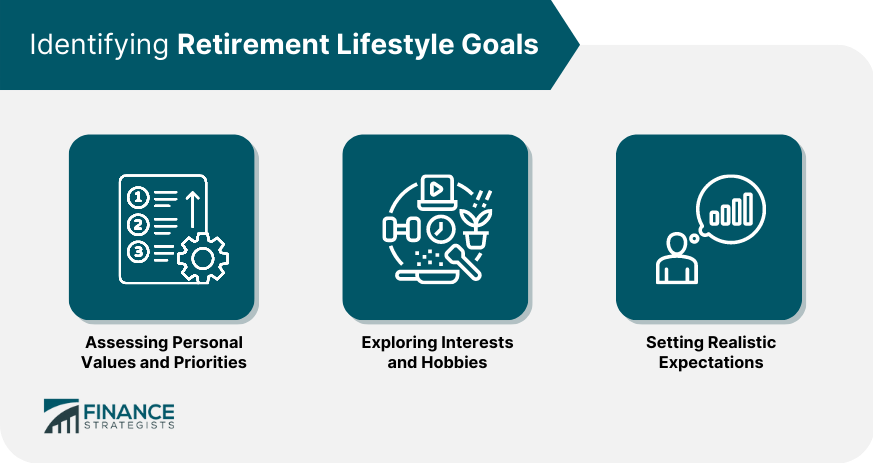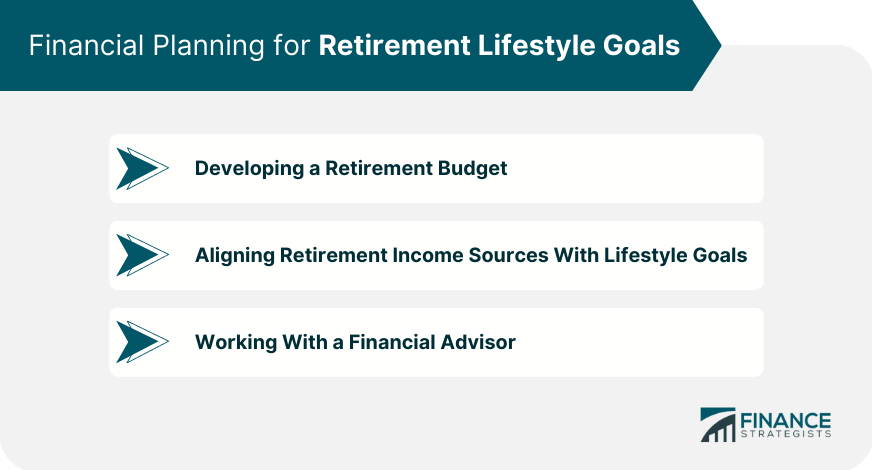Retirement lifestyle planning is the process of determining and achieving your desired lifestyle during retirement. It involves considering your housing needs, healthcare expenses, leisure activities, and social engagements. Retirement lifestyle planning helps individuals align their values, interests, and goals with their financial resources, ultimately enhancing their overall well-being and happiness. This process requires a careful assessment of one's goals and priorities, as well as the financial resources available to support these objectives. By developing a comprehensive plan that considers both lifestyle and financial aspects, individuals can make the most of their retirement years. The first step in retirement lifestyle planning is to assess one's personal values and priorities. This involves reflecting on what brings joy, fulfillment, and meaning to one's life, and identifying the activities and pursuits that align with these values. Retirement offers an opportunity to explore new interests and hobbies or to deepen existing passions. By considering the activities that bring personal satisfaction, individuals can create a more meaningful and fulfilling retirement lifestyle. While it's important to dream big and set ambitious goals, it's also essential to be realistic about the resources and time available for pursuing these objectives. Balancing aspirations with practical considerations can help individuals create a sustainable and enjoyable retirement lifestyle. Physical health plays a crucial role in overall well-being during retirement. Engaging in regular exercise, maintaining a balanced diet, and getting appropriate medical care are key components of a healthy retirement lifestyle. Mental well-being is equally important for a fulfilling retirement. Staying mentally stimulated, managing stress, and seeking support for mental health concerns can help retirees maintain a positive mindset and enjoy a higher quality of life. Social connections are vital for emotional well-being and can significantly impact the retirement experience. Building and nurturing relationships with friends, family, and community members can help retirees stay engaged and combat loneliness and isolation. Travel and leisure activities can enrich the retirement experience, providing new experiences and broadening horizons. Creating a travel bucket list can help retirees identify their dream destinations and prioritize their travel goals. While travel and leisure activities can be exciting and fulfilling, they can also be costly. Developing a budget for these pursuits can help retirees balance their desire for adventure with their financial resources. Individuals can explore cost-saving travel options, such as off-season travel, house-swapping, or group travel discounts, to stretch their travel budget further and enjoy more experiences during their retirement years. As retirees' lifestyles and priorities change, their housing needs may also evolve. Assessing current housing needs and preferences can help retirees determine whether their existing home is still suitable or if a change is necessary. Downsizing or relocating to a more affordable or suitable location can have a significant impact on retirees' finances and overall lifestyle. Retirees should carefully consider the cost of living, climate, and proximity to family and friends when evaluating potential housing options. When considering a move, individuals should evaluate not only the cost of living but also lifestyle factors, such as access to healthcare, recreational activities, and social opportunities, to ensure they choose a location that aligns with their retirement goals. Retirement offers opportunities to pursue educational interests and engage in lifelong learning activities. Many colleges and universities offer programs tailored to older adults, allowing retirees to expand their knowledge and stay intellectually stimulated. Lifelong learning can take many forms, from formal classes to self-directed learning, workshops, or online courses. By exploring various learning opportunities, retirees can stay mentally engaged and continue to grow personally and professionally. Maintaining intellectual stimulation during retirement can contribute to overall well-being and cognitive health. Retirees should consider incorporating activities that challenge their minds, such as reading, puzzles, or discussions on current events, into their daily routines. Volunteering and community involvement can provide a sense of purpose and fulfillment during retirement. Individuals should identify the causes and organizations that align with their values and passions and consider how they can contribute their time and skills. In addition to fostering a sense of purpose, volunteering can offer numerous benefits, including social connections, personal growth, and improved physical and mental well-being. By engaging in volunteer activities and community involvement, individuals can build a sense of purpose and fulfillment that enhances their overall retirement experience. Part-time work or freelance opportunities can provide additional income, social connections, and a sense of accomplishment during retirement. Individuals should consider their skills, interests, and desired work-life balance when evaluating potential work opportunities. Pursuing work that aligns with personal interests and skills can make part-time or freelance work more enjoyable and fulfilling. By identifying areas of passion and expertise, retirees can create a more satisfying work experience. While part-time work or freelancing can offer benefits, it's essential to balance work with leisure activities to maintain a healthy and enjoyable retirement lifestyle. Maintaining strong relationships with friends and family is crucial for emotional well-being during retirement. Individuals should try to stay in touch with loved ones and nurture these connections. Retirement can also be an opportunity to build new social networks and form new friendships. By participating in clubs, social organizations, or community activities, retirees can expand their social circles and foster meaningful connections. Joining clubs and social organizations can provide a sense of community and belonging, as well as opportunities for personal growth and enrichment. By actively participating in these groups, retirees can enhance their social lives and overall well-being. Estate planning is an essential aspect of retirement lifestyle planning, ensuring that assets are distributed according to the individual's wishes and in a tax-efficient manner. Retirees should regularly review and update their estate planning documents to remain current and accurate. Open communication about estate plans can help alleviate misunderstandings and conflicts among loved ones. By discussing their wishes and intentions with family members, retirees can help ensure a smoother transition of assets when the time comes. Gifting and charitable giving can help retirees achieve their legacy goals while providing potential tax benefits. By incorporating these strategies into their estate plans, retirees can support the causes and individuals they care about while maximizing their financial resources. Creating a retirement budget can help individuals align their income sources with their lifestyle goals. This involves evaluating expenses, identifying potential areas for cost savings, and ensuring that financial resources are allocated effectively to support their desired lifestyle. Retirees should review their income sources, such as pensions, Social Security benefits, and investment income, to ensure they can support their lifestyle goals. This may involve adjusting investment strategies or exploring additional income-generating opportunities. A financial advisor can help retirees develop a comprehensive financial plan that supports their retirement lifestyle goals. These professionals can guide investment strategies, tax planning, and other financial matters to ensure a secure and fulfilling retirement. Holistic retirement lifestyle planning involves considering both financial and non-financial aspects of retirement, helping individuals create a fulfilling and enjoyable experience during their golden years. By identifying their values, interests, and goals, retirees can develop a comprehensive plan that supports their desired lifestyle. Retirement is a dynamic phase of life, and individuals should regularly review and adjust their lifestyle plans to account for changes in personal circumstances, priorities, and financial resources. This ongoing process can help individuals stay on track and continue to enjoy a fulfilling retirement experience. By carefully planning for various aspects of their retirement lifestyle, individuals can achieve a fulfilling and enjoyable experience that aligns with their personal values, interests, and goals. Through prudent consideration of health and wellness, social connections, travel and leisure, housing, education, volunteering, and estate planning, individuals can create a retirement lifestyle that brings them happiness and satisfaction.What Is Retirement Lifestyle Planning?
Identifying Retirement Lifestyle Goals
Assessing Personal Values and Priorities
Exploring Interests and Hobbies
Setting Realistic Expectations

Health and Wellness in Retirement
Maintaining Physical Health
Focusing on Mental Well-Being
Staying Socially Connected
Travel and Leisure in Retirement
Creating a Travel Bucket List
Budgeting for Travel and Leisure Activities
Exploring Cost-Saving Travel Options
Housing and Relocation Considerations
Assessing Current Housing Needs
Exploring Downsizing or Relocating Options
Evaluating Cost of Living and Lifestyle Factors
Continuing Education and Lifelong Learning
Pursuing Educational Opportunities
Engaging in Lifelong Learning Activities
Staying Intellectually Stimulated
Volunteering and Community Involvement
Identifying Causes and Organizations to Support
Benefits of Volunteering in Retirement
Building a Sense of Purpose and Fulfillment
Part-Time Work or Freelance Opportunities
Considering Part-Time or Freelance Work
Aligning Work With Personal Interests and Skills
Balancing Work and Leisure in Retirement
Building and Maintaining Social Connections
Nurturing Existing Relationships
Developing New Social Networks
Participating in Clubs and Social Organizations
Estate Planning and Legacy Considerations
Reviewing and Updating Estate Planning Documents
Communicating Estate Plans With Loved Ones
Gifting and Charitable Giving Strategies
Financial Planning for Retirement Lifestyle Goals
Developing a Retirement Budget
Aligning Retirement Income Sources With Lifestyle Goals
Working With a Financial Advisor

Conclusion
Retirement Lifestyle Planning FAQs
Retirement lifestyle planning is the process of creating a plan to achieve the desired lifestyle and activities during retirement. It involves considering factors such as financial resources, health, hobbies, and interests.
Retirement lifestyle planning is important because it allows individuals to create a roadmap for the lifestyle they desire during their retirement years. Without a plan, retirees may struggle to adjust to their new lifestyle, and they may not have the financial resources to support their desired activities.
Some of the factors that should be considered when creating a retirement lifestyle plan include: expected retirement income and expenses, health and wellness goals, hobbies and interests, travel plans, and family obligations.
Yes, retirement lifestyle plans can be adjusted over time to reflect changes in circumstances or preferences. As retirees age, their health or financial situation may change, and they may need to modify their lifestyle plan to ensure it remains realistic and achievable.
Retirees can maintain a fulfilling retirement lifestyle by staying socially engaged, pursuing hobbies and interests, and staying physically active. They can also consider volunteering, traveling, or taking on part-time work to stay engaged with their communities and maintain a sense of purpose. A comprehensive retirement lifestyle plan can help individuals identify and prioritize the activities that are most important to them.
True Tamplin is a published author, public speaker, CEO of UpDigital, and founder of Finance Strategists.
True is a Certified Educator in Personal Finance (CEPF®), author of The Handy Financial Ratios Guide, a member of the Society for Advancing Business Editing and Writing, contributes to his financial education site, Finance Strategists, and has spoken to various financial communities such as the CFA Institute, as well as university students like his Alma mater, Biola University, where he received a bachelor of science in business and data analytics.
To learn more about True, visit his personal website or view his author profiles on Amazon, Nasdaq and Forbes.















